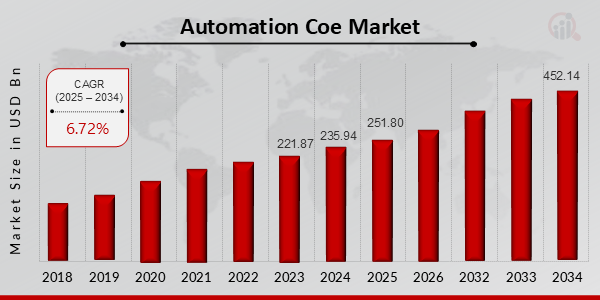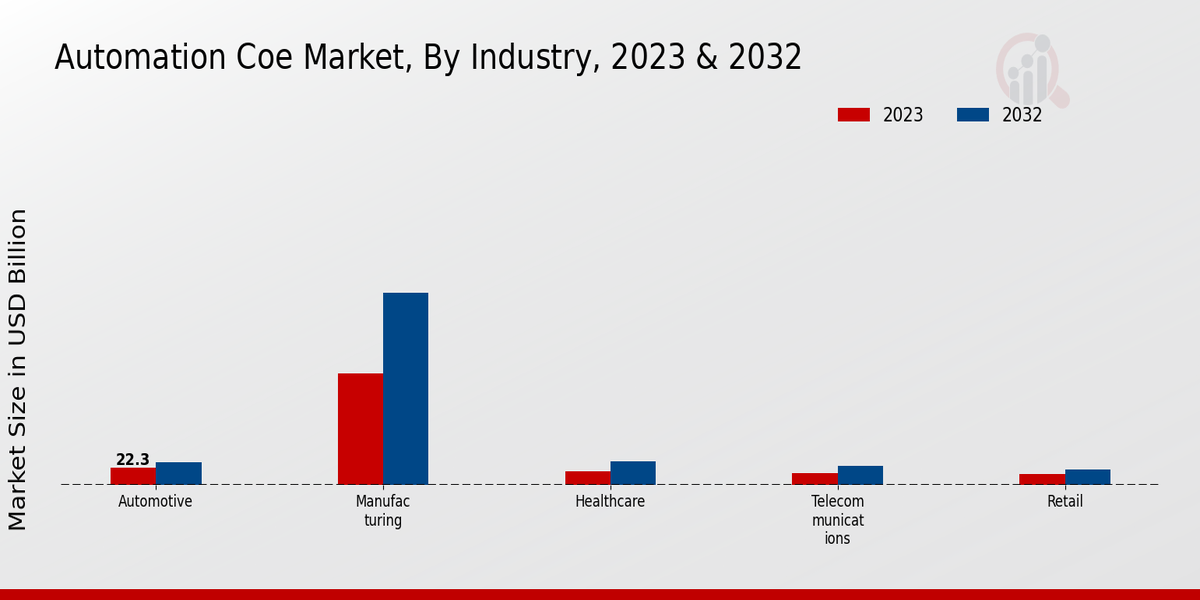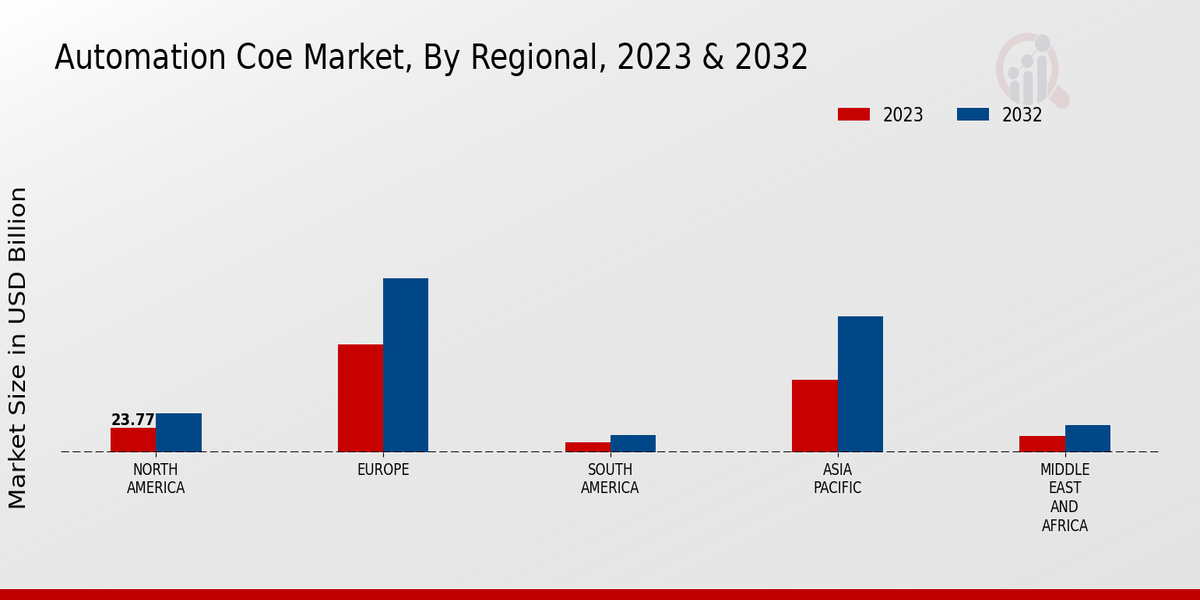Automation COE Market Overview
Automation Coe Market is projected to grow from USD 251.80 Billion in 2025 to USD 452.14 Billion by 2034, exhibiting a compound annual growth rate (CAGR) of 6.72% during the forecast period (2025 - 2034). Additionally, the market size for Automation Coe Market was valued at USD 235.94 billion in 2024.
Key Automation COE Market Trends Highlighted
The world Automation COE market has many opportunities. The increasing need for automation solutions to improve operational strength and productivity, along with the emergent use of new tech such as AI and machine learning (ML), are some of the major factors influencing the market.
On the other hand, there are also recent market tendencies that show more attention toward changing the way automation is used in organizations through its deployment in the cloud. Companies are also trending to automate data processes and optimize transformations around active data instead of static and delayed data, making integration of automation with data platforms an attractive proposition. However, there is potential for building automation solutions according to the industry's particular needs and providing special advantages to deal with the prevailing limitations of automation.
Figure 1 Automation Coe Market Overview(2025-2034)

Source: Primary Research, Secondary Research, Market Research Future Database and Analyst Review
Automation COE Market Drivers
Increasing Adoption of Automation Technologies
The growing adoption of automation technologies across various industries is a major driver of the Global Automation COE Market Industry. Automation technologies, such as robotic process automation (RPA), machine learning (ML), and artificial intelligence (AI), are being widely adopted by businesses to streamline operations, reduce costs, and improve efficiency. This trend is expected to continue in the coming years, as more and more businesses recognize the benefits of automation.The increasing adoption of automation technologies is also creating a demand for skilled automation professionals, such as automation engineers and data scientists.
This is further driving the growth of the Global Automation COE Market Industry.
Rising Demand for Remote Monitoring and Control
The rising demand for remote monitoring and control (RMC) solutions is another key driver of the Global Automation COE Market Industry. RMC solutions allow businesses to remotely monitor and control their operations, which can lead to significant cost savings and improved efficiency. This trend is being driven by the increasing adoption of cloud-based technologies, which make it easier and more affordable for businesses to implement RMC solutions.The rising demand for RMC solutions is also being driven by the growing need for businesses to improve their operational resilience.
RMC solutions can help businesses quickly identify and respond to disruptions, which can help to minimize the impact on their operations.
Government Initiatives and Support
Government initiatives and support are also playing a major role in driving the growth of the Global Automation COE Market Industry. Governments around the world are increasingly recognizing the importance of automation and are providing support to businesses that are adopting automation technologies. This support can come in the form of financial incentives, tax breaks, and other forms of assistance. Government initiatives and support are helping to make automation more affordable and accessible for businesses, which is further driving the growth of the Global Automation COE Market Industry.
Automation COE Market Segment Insights
Automation COE Market Industry Insights
The Global Automation COE Market is segmented into various industries, including Automotive, Manufacturing, Healthcare, Telecommunications, Retail, Financial Services, Aerospace Defense, and Energy Utilities. Each industry presents unique opportunities and challenges for automation, driving the growth of the overall market. Automotive: The automotive industry is a major adopter of automation, with a focus on improving efficiency, reducing costs, and enhancing safety. Automation is used in various processes, including assembly, painting, welding, and quality control. The increasing adoption of electric vehicles and autonomous driving technologies is further driving the demand for automation solutions in the automotive industry.
Manufacturing: The manufacturing industry has traditionally been a major adopter of automation, particularly in sectors such as electronics, automotive, and machinery. Automation helps manufacturers improve productivity, reduce labor costs, and enhance product quality. The growing trend towards Industry 4.0 and smart manufacturing is expected to further accelerate the adoption of automation in the manufacturing industry.
Healthcare: The healthcare industry is rapidly adopting automation to improve patient care, reduce costs, and streamline processes. Automation is used in a variety of applications, including robotic surgery, drug dispensing, and medical image analysis. The aging population and rising healthcare costs are driving the demand for automation solutions in the healthcare industry. Telecommunications: The telecommunications industry is leveraging automation to improve network performance, reduce operating costs, and enhance customer service. Automation is used in various processes, including network monitoring, fault management, and customer care.
The increasing adoption of 5G and the growing demand for bandwidth are driving the demand for automation solutions in the telecommunications industry. Retail: The retail industry is using automation to improve customer experience, reduce costs, and optimize inventory management. Automation is used in a variety of applications, including self-checkout kiosks, automated warehouses, and customer service chatbots. The growth of e-commerce and the need to improve supply chain efficiency are driving the demand for automation solutions in the retail industry.
Financial Services: The financial services industry is adopting automation to improve efficiency, reduce risk, and enhance compliance. Automation is used in various processes, including loan processing, fraud detection, and customer onboarding. The increasing regulatory requirements and the need to improve operational efficiency are driving the demand for automation solutions in the financial services industry. Aerospace Defense: The aerospace defense industry is using automation to improve design, manufacturing, and maintenance processes.
Automation is used in a variety of applications, including aircraft assembly, weapons systems testing, and mission planning. The growing complexity of aerospace systems and the need to reduce costs are driving the demand for automation solutions in the aerospace defense industry. Energy Utilities: The energy utilities industry is leveraging automation to improve grid stability, reduce operating costs, and enhance customer service. Automation is used in various processes, including power generation, distribution, and metering. The increasing adoption of renewable energy sources and the need to improve energy efficiency are driving the demand for automation solutions in the energy utilities industry.
Figure 2 Automation Coe Market Insights (2023-2032)

Source: Primary Research, Secondary Research, Market Research Future Database and Analyst Review
Automation COE Market Application Insights
The application segment plays a crucial role in shaping the growth dynamics of the Global Automation COE Market. Among the key applications, Testing, Process Automation, and Data Analytics hold significant market share. Testing, with a market size of USD 26.8 billion in 2023, is poised to grow at a robust CAGR of 7.2% over the forecast period. Process Automation, valued at USD 21.3 billion in 2023, is expected to witness a steady growth rate of 6.9% during the same period. Data Analytics, estimated to be worth USD 18.9 billion in 2023, is projected to expand at a CAGR of 8.1%.
Predictive Maintenance, Quality Control, Materials Handling, Order Fulfillment, and Inventory Management are other notable applications contributing to the overall market growth.
Automation COE Market Technology Insights
Robotic Process Automation (RPA), Artificial Intelligence (AI), Machine Learning (ML), Cloud Computing, Edge Computing, Internet of Things (IoT), and Digital Twin are key technologies driving the Global Automation COE Market growth. RPA is expected to generate substantial revenue of 13.03 billion USD by 2024, owing to its efficiency in automating repetitive tasks. AI and ML contribute significantly, enabling automation systems to analyze data, make predictions, and optimize processes. Cloud Computing provides scalability and cost-effectiveness, while Edge Computing supports real-time decision-making.
IoT connects devices and facilitates data collection, fueling automation processes. Digital Twin technology allows for virtual simulations, optimizing operations and reducing risks. These technologies collectively enhance automation capabilities, drive market growth, and transform industries.
Automation COE Market Deployment Model Insights
The global Automation COE Market is segmented on the basis of deployment model into on-premises, cloud-based, and hybrid. The market for on-premises deployment is projected to grow at a CAGR of 5.7% from 2023 to 2032, owing to the advantages of data security, control, and customization. Cloud-based deployment is expected to witness the highest growth rate of 7.2% during the forecast period due to its cost-effectiveness, scalability, and flexibility. The hybrid deployment model combines the benefits of both on-premises and cloud-based deployments and is projected to grow at a CAGR of 6.5% over the next decade.
In 2023, the on-premises deployment model accounted for the largest share of the Global Automation COE Market revenue, while the cloud-based deployment model is expected to surpass the on-premises model by 2028.
Automation COE Market Regional Insights
The regional landscape of the Global Automation COE Market presents diverse opportunities and challenges. North America dominates the market with a significant share, driven by the presence of numerous technology leaders and early adoption of automation technologies. Europe follows closely, with a strong presence of industrial automation and a growing focus on digital transformation. APAC is projected to witness substantial growth due to rapid industrialization, increasing government initiatives, and rising labor costs. South America and MEA offer emerging markets with untapped potential, as businesses seek to enhance efficiency and productivity.
Market data suggests that North America and Europe together account for over 60% of the Global Automation COE Market revenue in 2023, while APAC is expected to grow at a CAGR of over 8% during the forecast period. These regional insights provide a valuable perspective for businesses looking to expand their presence or target specific markets within the Global Automation COE Market.
Figure 3 Automation Coe Market Regional Insights(2023-2032)

Source: Primary Research, Secondary Research, Market Research Future Database and Analyst Review
Automation COE Market Key Players And Competitive Insights
Major players in the Automation COE Market industry are constantly striving to gain a competitive edge by introducing advanced technologies and innovative solutions. Leading Automation COE Market players are focusing on expanding their global presence through strategic partnerships, acquisitions, and joint ventures. The Automation COE Market development is driven by the increasing demand for automation solutions across various industries, including manufacturing, automotive, and healthcare. The competitive landscape of the Automation COE Market is characterized by a mix of established players and emerging startups.
A leading company in the Automation COE Market is Siemens. Siemens offers a comprehensive portfolio of automation solutions, including programmable logic controllers (PLCs), distributed control systems (DCSs), and human-machine interfaces (HMIs). The company has a strong global presence and serves customers in a wide range of industries. Siemens is known for its commitment to innovation and its ability to provide customized solutions to meet the specific needs of its customers.
A competitor company in the Automation COE Market is Rockwell Automation. Rockwell Automation offers a similar range of automation solutions as Siemens, including PLCs, DCSs, and HMIs. The company has a strong presence in the Americas and is expanding its global footprint through strategic acquisitions. Rockwell Automation is known for its focus on customer service and its ability to provide end-to-end solutions for its customers.
Key Companies in the Automation COE Market Include
Automation COE Market Industry Developments
The global Automation COE market is projected to grow from USD 207.13 billion in 2023 to USD 371.4 billion by 2032, at a CAGR of 6.7% from 2024 to 2032. Rising adoption of automation technologies, increasing need for operational efficiency, and growing demand for data-driven insights are key factors driving market growth. The manufacturing sector is expected to hold the largest market share over the forecast period due to the increasing adoption of automation solutions to improve productivity and reduce costs.
Additionally, the growing adoption of cloud-based automation platforms and the emergence of advanced technologies such as artificial intelligence (AI) and machine learning (ML) are expected to provide significant growth opportunities for the market. Recent developments include the launch of new automation platforms by major vendors, strategic partnerships between automation providers and technology companies, and the increasing adoption of automation solutions in emerging economies.
Automation COE Market Segmentation Insights
-
Automation COE Market Industry Outlook
-
Automation COE Market Application Outlook
-
Automation COE Market Technology Outlook
-
Automation COE Market Deployment Model Outlook
-
Automation COE Market Regional Outlook
|
Report Attribute/Metric
|
Details
|
|
Market Size 2024
|
235.94 (USD Billion)
|
|
Market Size 2025
|
251.80 (USD Billion)
|
|
Market Size 2034
|
452.14 (USD Billion)
|
|
Compound Annual Growth Rate (CAGR)
|
6.72% (2025 - 2034)
|
|
Report Coverage
|
Revenue Forecast, Competitive Landscape, Growth Factors, and Trends
|
|
Base Year
|
2024
|
|
Market Forecast Period
|
2025 - 2034
|
|
Historical Data
|
2019 - 2023
|
|
Market Forecast Units
|
USD Billion
|
|
Key Companies Profiled
|
FANUC Corporation, Emerson Electric Co., Omron Corporation, Yaskawa Electric Corporation, Mitsubishi Electric Corporation, Yokogawa Electric Corporation, Kawasaki Heavy Industries, Ltd., ABB Ltd., Honeywell International Inc., KUKA AG, General Electric Company, Schneider Electric SE, Rockwell Automation Inc., Siemens AG, ABB Robotics
|
|
Segments Covered
|
Industry, Application, Technology, Deployment Model, Regional
|
|
Key Market Opportunities
|
Growing adoption of automation in various industries Rising demand for improved productivity and efficiency Increasing need for remote monitoring and control Advancements in artificial intelligence AI and machine learning ML Government initiatives and investments in automation
|
|
Key Market Dynamics
|
Growing demand for automation Increasing adoption of AI and ML Government initiatives for smart cities Advancements in cloud computing Rising labor costs
|
|
Countries Covered
|
North America, Europe, APAC, South America, MEA
|
Frequently Asked Questions (FAQ):
The global Automation COE market size is estimated to reach USD 452.14 billion by 2034, exhibiting a CAGR of 6.72% from 2025 to 2034.
North America is expected to hold the largest market share of 38.5% in 2024, owing to the presence of major technology hubs and early adoption of automation technologies.
Key applications of Automation COE include manufacturing, healthcare, logistics, retail, and financial services.
Major competitors in the global Automation COE market include ABB, Rockwell Automation, Siemens, Schneider Electric, and Honeywell.
Key trends include the rising adoption of Industry 4.0 technologies, increasing demand for automation in manufacturing and supply chain management, and growing awareness of the benefits of automation.
The global Automation COE market is projected to grow at a CAGR of 6.72% from 2025 to 2034.
The manufacturing industry is expected to witness the highest growth, owing to the increasing adoption of automation technologies to improve efficiency and productivity.
Challenges include the high cost of implementation, lack of skilled workforce, and concerns about job displacement.
Opportunities include the rising adoption of cloud-based automation solutions, increasing demand for automation in emerging economies, and a growing focus on sustainability.
Key factors driving growth include the need for increased efficiency, reduced costs, improved product quality, and enhanced safety.

















